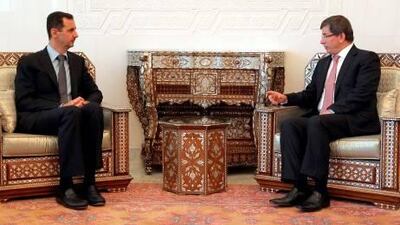Within days, the embattled Syrian regime has been dramatically isolated in the Middle East, marking a potential turning point in President Bashar Al Assad's bloody attempts to quell a determined five month-old uprising.
Turkey's foreign minister was in Damascus yesterday to deliver a warning that Ankara, a highly influential and once steadfast ally, has "run out of patience" with Syria's "savage" crackdown on popular unrest.
Ahmed Davutoglu told a televised news conference after his return to Ankara that they had discussed specific reform steps without giving further details, but analysts believe he might have threatened to support stronger action by the United Nations Security Council. Mr Al Assad, in a statement issued after the meeting, reiterated his commitment to battle against the "terrorist groups" he claims are behind the protests. "We will not waver in our pursuit of terrorist groups", state news agency Sana reported him as saying.
Mr Davutoglu's visit followed a remarkably robust condemnation of Syria's brutal tactics by King Abdullah bin Abdul Aziz of Saudi Arabia whose surprise intervention on Sunday night ended months of virtual silence from the Arab world.
The Saudi monarch urged Damascus to "stop the killing machine", insisting that Syria's ferocious military onslaught against its own people had "nothing to do with religion, or values, or ethics".
Hours later, Bahrain and Kuwait followed Riyadh's lead by summoning their ambassadors from Damascus "for consultations". Iraq yesterday also condemned the bloodshed and "oppression of freedom" in neighbouring Syria while Egypt said Damascus was heading to a "point of no return."
And Russia, one of Syria's key arms suppliers, declared that Moscow wanted an end to the bloodletting and the start of a dialogue to pull the country out of the crisis.
Representatives from India, South Africa and Brazil were meanwhile due in Damascus to deliver a similar message.
"The Saudi intervention indicates that a watershed has been passed, that Arab governments can no longer stay silent," said Gerald Butt, a Cyprus-based author on the Middle East. "Psychologically, Assad's regime will feel isolated in the region."
The sudden and momentous policy shift by Riyadh, the Arab world's Sunni heavyweight, will raise hopes that a tougher approach by Arab states could succeed where western pressure and diplomacy has so far failed.
King Abdullah's call followed private "contacts [with Damascus] which hit a brick wall", the Saudi daily, Al-Watan, said.
The monarch's condemnation of the Syrian regime surprised many and was warmly welcomed by the Obama administration in Washington and the Syrian opposition.
The Kingdom has had a troubled relationship with Damascus. Saudi Arabia is deeply opposed to Syria's long alliance with Iran and its support for Hizbollah in Lebanon. Riyadh also blames Damascus for ordering the 2005 assassination of Lebanon's Sunni former prime minister, Rafiq Hariri, who was a close Saudi ally.
But, along with other Gulf Arab states, Saudi Arabia has shied away from declaring support for popular uprisings in the region.
Saudi Arabia sent troops to help Bahrain quell demonstrations in earlier this year and has given asylum to Tunisia's Zine el Abidine Ben Ali and Yemen's Ali Abdullah Saleh. Riyadh also criticised the decision to put Egypt's former dictator, Hosni Mubarak, on trial.
While Arab leaders supported international action against Col Muammar Qaddafi in Libya, they had been leery of openly criticising Mr Al Assad, whose regime was admired by many in the region for standing up to Israel. Also, unlike Libya, Syria sits in the heart of the Middle East and Arab governments fear sectarian civil warfare there could cause havoc regionally.
"There is quite a lot of fear and respect for the Syrian regime and while it had a chance of surviving, no Arab government wanted to stick its neck out against Damascus," Mr Butt said in an interview. "By speaking out now, it seems they feel the tide is turning against Mr Al Assad.
The Syrian leader's sole ally is Iran, a Shiite theocracy which Saudi regards as its main regional rival.
Saudi Arabia's denunciation of Damascus was also likely influenced by public opinion in the Arab world, which has been horrified by the bloodshed in Syria, especially during Ramadan. More than 300 protesters are said to have been killed in the last week alone.
Qatar closed its embassy in Damascus last month over fears it might be attacked because of critical coverage of the Syrian regime's handling of the uprising by Al Jazeera, the Doha-based satellite news network.
Media outlets in Saudi Arabia and other Gulf states have also been highly critical of the Syrian government and there have been street protests in Kuwait denouncing Mr Al Assad.
Yet the stinging rebuke of Syria by Gulf states is unlikely to be followed by decisive action, and there is no indication that the Saudi condemnation will translate into direct financial support for the Syrian rebels, analysts said.
The Arab League on Monday ruled out military action of the kind it backed against Libya, saying it would use persuasion rather than "drastic measures" to halt the bloodshed in Syria.
"Syria is simply too big, powerful and strategically-located for the international community to risk any kind of military intervention," Mr Butt said. "And conceivably, if the Assad regime felt cornered, it could lash out against Israel, provoking a whole regional conflict that no one wants."

